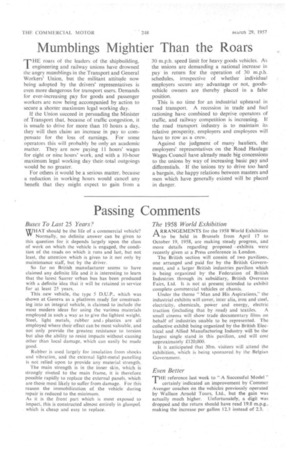Mumblings Mightier Than the Roars
Page 28

If you've noticed an error in this article please click here to report it so we can fix it.
THE roars of the leaders of the shipbuilding, engineering and railway unions have drowned the angry mumblings in the Transport and General Workers' Union, but the militant attitude now being adopted by the drivers' representatives is even more dangerous for transport users. Demands for ever-increasing pay for goods and passenger workers are now being accompanied by action to secure a shorter maximum legal working day.
If the Union succeed in persuading the Minister of Transport that, because of traffic congestion, it is unsafe to drive for more than 10 hours a day, they will then claim an increase in pay to compensate for the loss of earnings. For some operators this will probably be only an academic matter, They are now paying 11 hours' wages for eight or nine hours' work, and with a 10-hour maximum legal working day their) total outgoings would be no greater.
For others it would be a serious matter, because a reduction in working hours would cancel any benefit that they might expect to gain front a 30 m.p.h. speed limit for heavy goods vehicles, As the unions are demanding a national increase in pay in return for the operation of 30 m.p.h. schedules, irrespective of whether individual employers secure any advantage or not, goods. vehicle owners are thereby placed in a false position.
This is no time for an industrial upheaval in road transport. A recession in trade and fuel rationing have combined to deprive operators of traffic, and railway competition is increasing. If the road transport industry is to maintain its relative prosperity, employers and employees will have to row as a crew.
Against the judgment of many hauliers, the employers' representatives on the Road Haulage Wages Council have already made big concessions to the unions by way of increasing basic pay and differentials. If the Unions try to drive too hard a bargain, the happy relations between masters and men which have generally existed will be placed in danger.




























































































